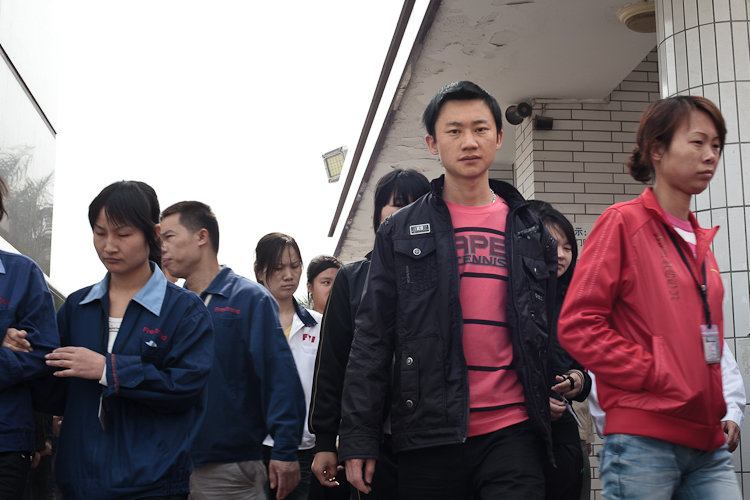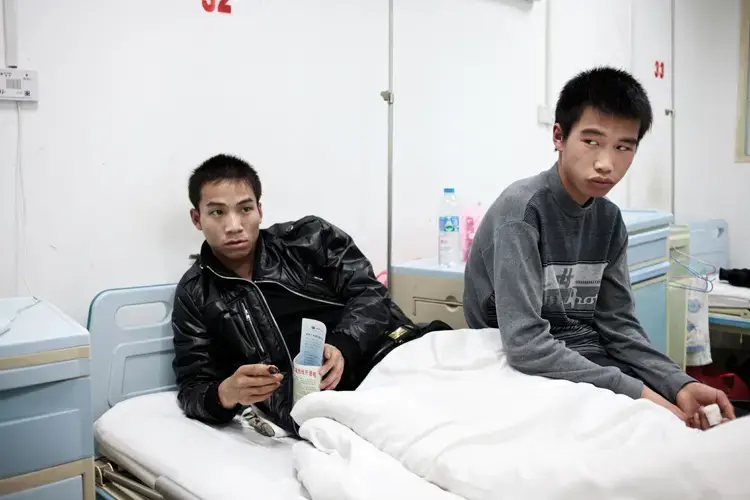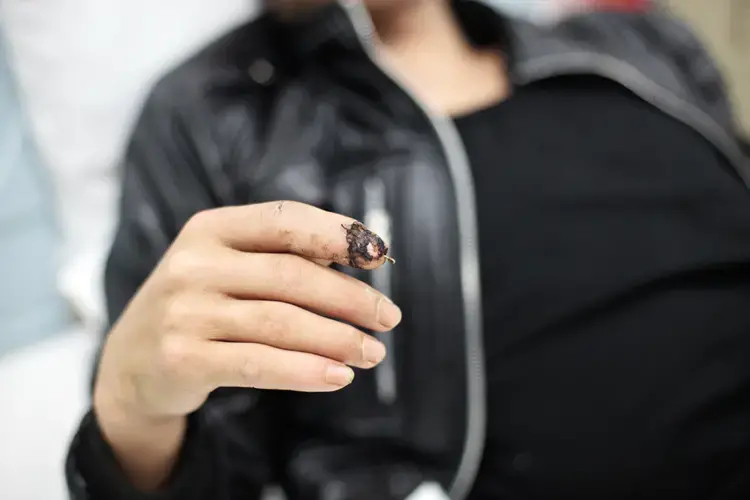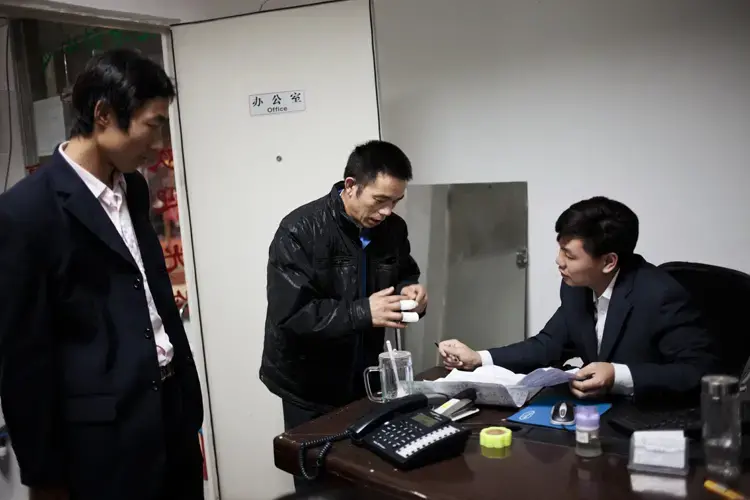Most of America probably now knows that Mike Daisey fabricated sections of his popular one-man play about Apple iPads and his This American Life broadcast. Take his visit to a Foxconn factory and nearby restaurant in the coastal city of Shenzhen. He says he met members of an underground union, including some exposed to n-hexane, a potent neurotoxin: "their hands shake uncontrollably," Daisey said. "Most of them can't even pick up a glass."
Daisey didn't actually meet these workers. But workers like them existed. They were more than 1,000 miles away in Suzhou, a city near Shanghai. There Wintek, a Foxconn subcontractor, makes screens for the iPad. Wintek used n-Hexane to clean their screens because it dries more quickly than alcohol. Apple admitted the error in its 2011 Corporate Social Responsibility report, and Wintek reportedly paid $1.5 million to cover workers' medical expenses.
"Leg can't move"
Wintek isn't unusual. If Daisey had encountered a labor advocate I'll call Wang Liang, he would have been able to cite real people. Wang, who asked that I use a pseudonym, is a former toy factory worker turned self-taught or "barefoot" lawyer in his early 30s. Barefoot lawyers file lawsuits on behalf of migrant workers, often their only option for recourse in China.
Wang took me on a tour that even Daisey couldn't have dreamed up. We traveled through hardscrabble sections of Dongguan's Tangxia Town, a factory town near the coast in Guangdong. He introduced me to a worker fired for organizing a union, a man denied overtime payments and a woman whose symptoms mirrored those of the Wintek workers. The notes about her on his printed spreadsheet were: "leg can't move."
That woman is Shi Yuping, a mother of two with short black hair, capris and flip-flops. Shi is in her late thirties but looks much older. We sat at a picnic table outside a convenience store as Shi told her story. Her husband Jiang Ancai stood nearby and listened.
Shi worked for a Hong Kong-owned plastics factory. The factory used a chemical as toxic as n-hexane to clean plastic parts. Shi fell ill during a trip home to Henan province to see her mother and her children (many migrant workers send children to stay with grandparents so the parents can both work). She received no compensation and no reimbursement for her 20-day hospital stay. "She called the company to ask for continuation of the leave," Wang explained. Instead, she was fired. The factory held two months of salary, money that Wang was suing to recover.
Shi suffered degenerative nerve damage and can no longer work. When she got up to leave the picnic table her left leg went lame. She had trouble even getting into her flip-flops.
Shi did not work for a supplier of a high-profile brand, like Apple. There was no coverage of her case in the English-language media.
Safety off
Foxconn's infamous iPad City plant is located in Shenzen, in the Ba'oan Longhua subdistrict. Many factories here are unregistered and, therefore, unregulated.
The All China Federation of Trade Unions, China's only national trade union, mostly looks out for the factory owners, so informal labor groups have emerged. China Labor Watch, a local NGO, holds weekly outreach meetings. At one I attended, five young people discussed and compared serious hand injuries. In several of these cases, safety guards on machinery had been tampered with or removed to quicken production.
At a Bao'an hospital, I followed two female staffers from China Labor Watch during their weekly visit to meet injured workers. Two young men, Liu Wei, 18, and Ling Shiling, 23, nursed grisly hand injuries. Neither was familiar with the concept of a union. Liu was the luckier of the two: his uncle owned part of the factory where he worked, so he was helping with his medical bills.
40,000 fingers
Zhang Zhiru, a well-known barefoot lawyer in Longhua, estimates he sees about 10 workers with similar hand injuries every week. According to a 2007 report from China Labor Watch, workers in the Pearl River District lose 40,000 fingers to industrial accidents a year.
Partly, that's because the Chinese think they can figure out solutions after accidents happen, explains Jeremy Prepscius, a former Asian sourcing head for Nike, who now heads the Hong Kong office for the NGO Business for Social Responsibility.
BSR members include Wal-Mart, Gap and General Electric, companies with brands to protect. These firms can and do pressure suppliers to maintain better safety standards. Better but not perfect. In 2010, for example, the Hong Kong based NGO Students and Scholars Against Corporate Misbehaviour highlighted the case of a worker at Wal-Mart supplier Elec-Tech. Ruan Li Bing lost his forearm in an accident. He called his workplace "the factory that produces severed fingers and hands."
Smaller and lesser-known factories – some of which are illegal – evade the lawsuits filed by barefoot lawyers by changing their name.
A pervasive problem
After witnessing the violence of China's manufacturing process over a couple of weeks in Shenzhen and Dongguan, I was reminded of the gun violence in certain American communities. It seemed like every Chinese migrant worker either had a hand injury, a repetitive stress injury or had lost a limb (or life). And if they themselves hadn't experienced this they knew someone who had.
Many of China's labor injuries stem from the expectation that Chinese manufacturers turn out more product in less time, combating rising labor and overhead costs and shrinking margins. Such demands go deep in the supply chain. Apple leans on Foxconn, which leans on Wintek, which leans on its supplier, who skimps on safety to protect razor-thin margins. This happens whether the supplies are for export or not. The popularity of Woer-Mar (how the Chinese say Wal-Mart) within China and of its several domestic competitors almost guarantees that the race to the bottom will continue to play out domestically.
Blaming Mike Daisey for lying about Steve Jobs misses the point. Apple's competitors (Kindle Fire, anyone?) also employ Foxconn. Foxconn does need to reform its high-pressure environment. And so do a staggering number of Chinese manufacturers, across various categories. These manufacturers supply us many of the products we use every day, allowing us unrestricted affordable consumption. It's something to think about the next time you're shopping.










